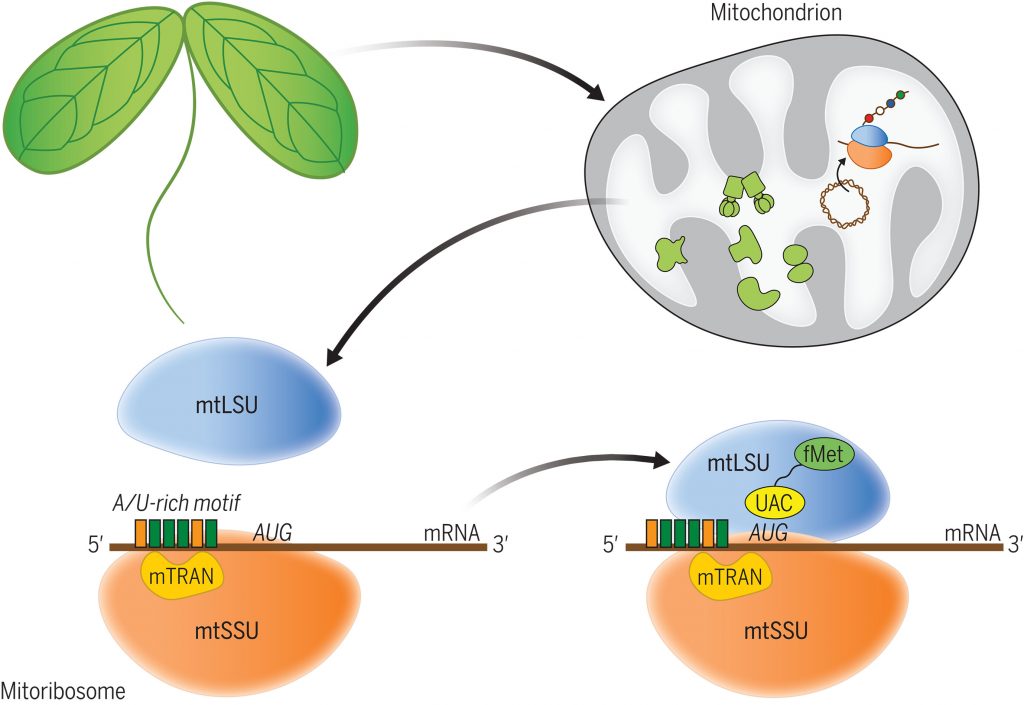On September 1, 2023, Science published online a research paper titled "An mTRAN-mRNA interaction mediates mitochondrial translation initiation in plants" by Olivier Van Aken's team at Lund University and his collaborators. This study established the protein factors mTRAN1 and mTRAN2 for protein translation initiation in Arabidopsis mitochondria. mTRAN guides mitochondrial ribosomes to mitochondrial mRNA and initiates translation initiation by binding to conserved RNA motifs in the 5' region of mitochondrial mRNA, revealing the initiation mechanism of protein translation in plant mitochondria.
Mitochondria are eukaryotic organelles essential for energy conversion and metabolism. Since mitochondria are likely remnants of endosymbiotic bacterial mergers, they retain many similar characteristics to their bacterial ancestors. Mitochondria in most eukaryotes retain their own genome, encoding a set of proteins required for mitochondrial function. However, during evolution, many mitochondrial components have differed greatly between eukaryotes, especially the mitoribosome. Therefore, the translation machinery of mitochondrial proteins also diverges among eukaryotic populations and has different ribosome structures and initiation sites. Because mitochondrial mRNA in plants lacks the bacterial Shine-Dalgarno ribosome binding sequence, how its mitochondrial mRNA is recognized by mitoribosome and initiates protein translation has been a mystery.
The team found that the Arabidopsis thaliana adenylate cyclases AT4G15640 and AT3G21465 they identified earlier may be the mitoribosome component rPPR10/mS83, and named them "mitochondrial translation factors" mTRAN1 and mTRAN2. This study shows that mTRAN is conserved in land plants but does not exist in green algae, animals and fungi. It is a type of plant-specific protein. Further research found that mTRAN only exists within mitochondria. When mTRAN1 and/or mTRAN2 are compromised in Arabidopsis, plants exhibit varying degrees of growth restriction, ranging from growth inhibition to embryonic lethality, indicating that they are essential for normal plant development.

This study found that mitochondrial biogenesis and function were severely impaired in mtran double mutants, with significantly reduced abundance and activity of all oxidative phosphorylation complexes containing mitochondrial-encoded subunits (complexes I, III, IV, and V). Using co-immunoprecipitation (Co-IP), the researchers discovered that mTRAN1 and mTRAN2 are part of the plant mitochondrial "small" subunit (mtSSU).
Through transcriptome analysis of mtran double mutants, the study found rearrangements in nuclear, mitochondrial, and chloroplast gene expression, indicating mitochondrial translation defects. Consistent with this, the study found that mtran double mutants significantly reduced mitochondrial protein synthesis rates. In mtran double mutants, a large fraction of mitochondrial mRNA fails to associate with mitoribosome, indicating that mTRAN plays an important role in translation initiation of mitochondrial proteins. Structural modeling revealed that the mTRAN proteins are α-solenoid proteins related to the pentatricopeptide repeat (PPR) proteins, suggesting that mTRAN is a potential RNA-binding protein. By searching for RNA conserved motifs in the 5' sequences of thousands of plant mitochondrial genes, the researchers identified A/U-rich motifs (CUUUxU and AAGAAx/AxAAAG) and confirmed that mTRAN1 can directly bind these RNA motifs in vitro and in vivo.
Finally, using Ribo-seq, this study found that mTRAN may be required for mRNA binding and initiation of translation in all plant mitochondria, indicating that mTRAN proteins may be a universal mtSSU translation initiation factor.
In summary, this study discovered two mitochondrial proteins, mTRAN1 and mTRAN2, and identified them as factors required for the initiation of mitochondrial protein translation in Arabidopsis. As part of mtSSU, mTRAN protein binds to the conserved A/U-rich motif in the 5' region of mitochondrial mRNA, thereby guiding mitoribosome to the mitochondrial mRNA and initiating translation initiation, providing an in-depth understanding of the translation initiation of plant mitochondrial proteins.
Reference:
Tran, H.C., Schmitt, V., Lama, S. et al. An mTRAN-mRNA interaction mediates mitochondrial translation initiation in plants. Science 381, 6661 (2023).